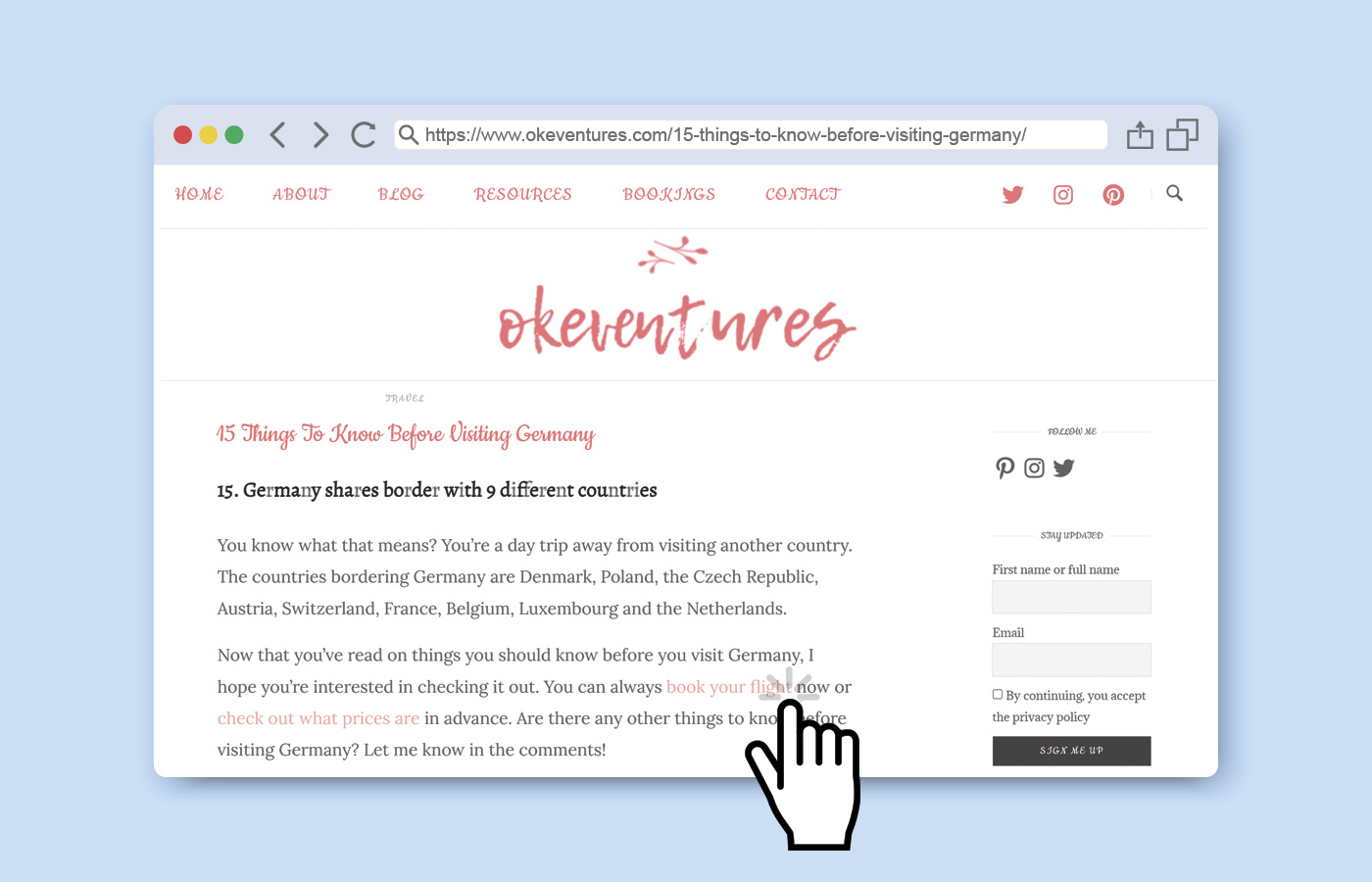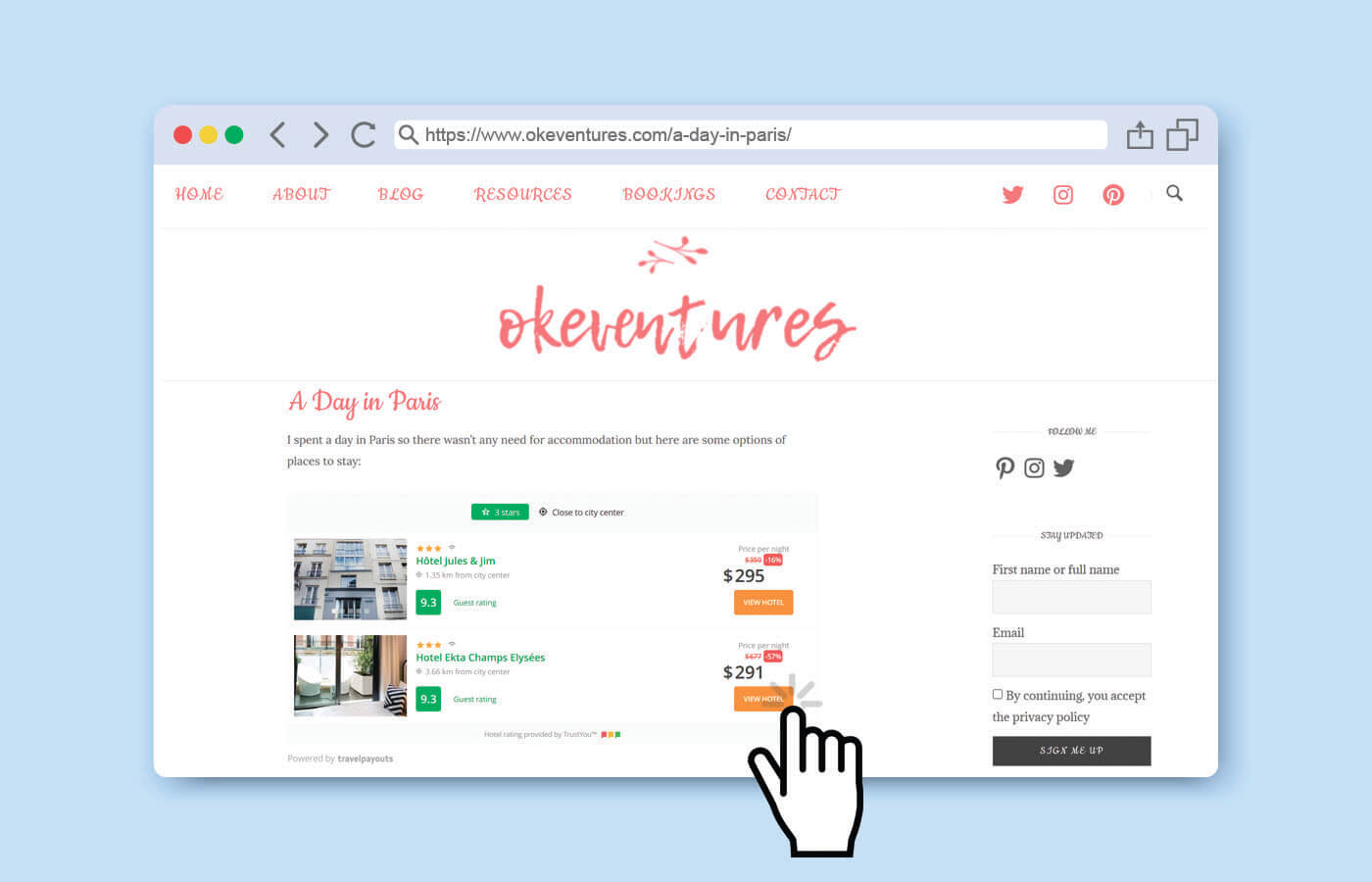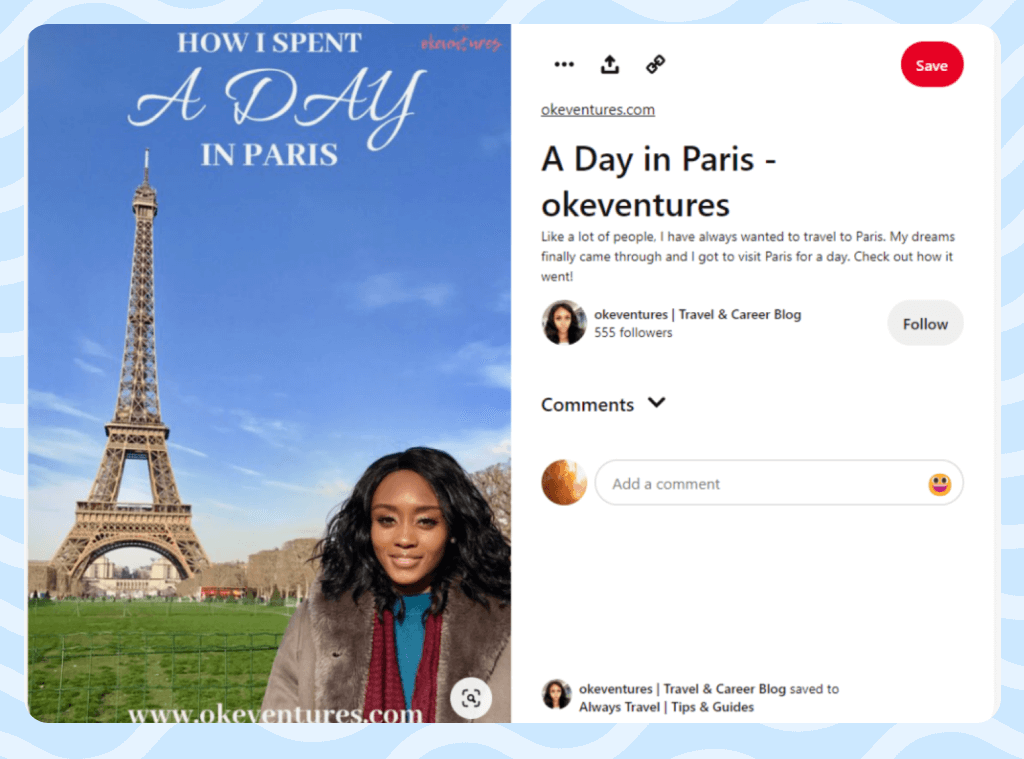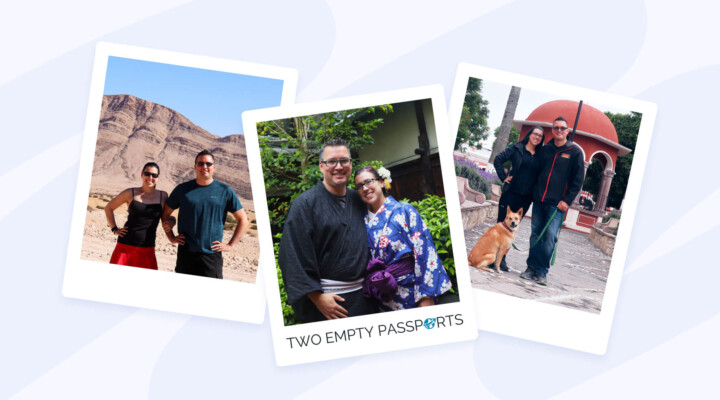How It All Began
I have always loved traveling from an early age. As a kid, I traveled a little bit, visited my sister in London, visited my family in Canada, and so on, but it was nothing super exotic. I used to travel sparingly. By the time I started to travel more, especially when I attended college in the US, I figured out a way to budget better to be able to make the trips happen.
My friends were always surprised and asked how I could afford to go on these trips. I didn’t have much money, but I was super strategic.
Right when I graduated college, because I had so many people asking me about my trips, I decided to start a blog and figure out a way to communicate with people rather than explaining things to each of them one by one. I simply wanted to have a platform that other people could visit.
Another reason I started my blog was my friends. They had complained about tickets being expensive. That was why I initially began thinking about finding a way to provide people with a more affordable option for travel.
I started my blog in 2018. It was not easy for me, as I’m a very private person. Writing a blog about what I do sort of contradicts my aversion for telling people what I do.
At first, I encountered many technical difficulties. Perhaps it would have been easier to start a blog on another platform. However, if I’m going to do something, I’m going to do it fully. So, I had to learn about developing a website using WordPress. After having the idea to run a blog, it definitely took me time to publish my first post since I had to figure out how to create the site itself, the structure, and so on.
My blog began as a place for my friends and family. Later, people from other countries and places I’ve never even been started to visit my website and comment on my blog. Today, my blog is visited by people from over 100 countries, which really motivates me to create more content.
At the point when I started the blog, I read a lot of blogs about people who quit their jobs to travel full-time. However, I didn’t want to do that. It was hard to find other bloggers that were in that same headspace as me. At that time, there was a lack of blogs for people who wanted to hold down a certain career and travel in their spare time.
I am fully targeting groups of young working professionals, who want to figure out how to be successful in their careers and still be able to explore all the places that they want to visit.
In this day and age, there are so many different types of jobs and people who have flexible hours and can travel more. Personally, I work a regular 9-to-5 job and have less than one month of vacation time each year. Despite this, I still try to travel about once per month. As a result, my blog focused on the audience of people who want to structure their vacation days in a way that can work out for them to travel often.
My Blog Income
As many of my friends always asked me where to buy flight tickets and how to find the cheapest accommodation options, I decided to focus a lot on the flights and hotel search engine based on the White Label by Travelpayouts,.
Affiliate Marketing
Many “Blogging 101” courses say that you need ads to monetize your blog. However, my traffic volume is not large enough for ads to make much of an impact. By determining my readers’ intentions (“I need to book a flight or affordable hotel”), I tend to get more people to book and I earn income for every flight ticket sold or hotel booked.
Now, I focus more on affiliate links to monetize my blog. Even when it comes to driving traffic to the blog itself, I try to drive people to the search engine, which is like a two-way street since I’m able to monetize my blog and people are able to get great discounts on flights and hotels. It’s a win-win situation.
In addition to flights and hotels, I share affiliate links to tours and activities. The GetYourGuide affiliate program is a great program. I’ve used them personally a lot of times and now I have a lot of affiliate links for activities as well.
To choose an affiliate program to work with, I usually go with brands that I used in the past or those that I think I would use and add to my blog posts. Choosing an affiliate program is a straightforward, no brainer process. I am sharing affiliate links in blog posts to specific brands because doing so is really helpful to me.
In addition to travel affiliate programs on Travelpayouts, I’ve tried an Amazon affiliate program. It’s also pretty good because they have a lot of things to offer your audience.
How to Place Affiliate Tools
The way I place affiliate tools varies per post. Mostly, I use affiliate links and widgets. If I think it fits, I use banners as well, or all of them at the same time.
Based on the White Label by Travelpayouts, I created my flight search engine and usually drive traffic there. For example:

I also use widgets, such as the Hotellook destination widget:

Travel Blogging as a Profitable Hobby
For me, blogging is still a hobby compared to my full-time job. When I started my blog, I worked full-time as a Strategy Consultant at a consulting firm, where I focused on solving business problems and there was rarely any overlap with my blog work. I’ve been working full-time for a few years and will now transition to Stanford University to pursue my MBA.
I have mixed feelings about transitioning to being a full-time blogger. I’ve met a number of full-time bloggers and trips are like work for them. When I go on a trip, I want it to be enjoyable. Whether or not I choose to blog about it, I don’t want to feel the innate pressure of travel being tied to my income.
The reason why I enjoy my way of blogging is that there is a balance. I want to travel and enjoy my experiences. When I come back from the trip, I don’t want to feel the innate pressure that, if I don’t talk about my experience, I’m not going to make money.
I’m pretty good at planning out when to use my vacation days, while still making money from my full-time job and saving a lot. I just like the balance between full-time and blogging.
The transition to full-time blogging would be pretty tough for me because it’s going to change the way I travel. At least right now, I don’t want to make that shift.
Content Creation
Right now, I create all my content myself; however, I thought about hiring a freelancer to edit my content. The writing process is something I want to do myself as I write specifically about my experiences and thoughts.
In terms of what I write about, I have a running list of different topics and add new ones semi-spontaneously. For example, if there’s a specific experience I’m going through at the moment, such as using a credit card for travel, I’ll add the tagline to my list of topics that I want to write about.
On the days that I want to write, I return to that list and think about which of my ideas are most relevant.
In the beginning, it was challenging to figure out the balance between writing what I want to say versus trying to figure out what other people want to hear. You might also read a lot of blogs about starting blogs that talk about figuring out your target market and then focusing your efforts on catering to that market.
If instead of writing what you want to say, you focus on what you should say according to other people’s interests, you’re not staying true to yourself and it will be that much harder to continue blogging.
My process of choosing topics is probably not super advanced. Of course, in addition to writing about my own ideas, sometimes, I do check the keywords and perform Google searches to see what’s going on there. However, I don’t focus a lot on these aspects.
Interestingly, blogging changed the way I consume content myself. Blogging gives me a different perspective on figuring out which bloggers’ posts I read before going on a trip. In addition, I find myself searching less for recommendations on Google versus trying to find specific bloggers to read their recommendations.
I think the main difference between unsuccessful and successful content creators comes down to authenticity. There is so much content out there, so you should focus on telling your story and sharing your experience, especially if you’re a travel blogger.
When I read some travel blogs, I can just tell when they are focusing a little too much on the sponsors. Sometimes, it seems like they lose themselves. Being authentic and doing things your own way is definitely the biggest difference, for me, when it comes to being a successful content creator.
If I could give advice to myself four years ago, when I first started, I would definitely say: just keep writing because it takes time to figure out what type of content you enjoy creating.
There is definitely still a gap between the number of things in the list versus the number of blogs that I write. There are a lot of finished blogs in my drafts for some strange reason, so I often go back and tell myself: just publish it.
When it comes to content, be patient. Sometimes, content might not have as much traffic now, but after a few months or years, it becomes more relevant and drives more traffic.
Traveling Solo
I have had a number of people who were not close to me at all tell me about how they’ve followed some of my travels and visited the places I’ve been to. While that is cool, it is sometimes a bit scary not knowing who is following my travels.
Now, I’m extremely conscious about having a lag between when I travel and posting about my trip.
In addition, I also like to vary the timeline to which I post, so that it’s harder to track where I am. I think this is a good approach in the age of social media. You should be conscious since you never know the intentions of other people. I just want to make sure that people can’t track me so easily.
How to Use Pinterest to Promote a Travel Blog
A lot of my traffic is drawn from Pinterest. This is funny because, before I started my blog, I was never on Pinterest before. Because I heard that other people use Pinterest to gain traffic, I drew attention to this traffic source as well.
Compared to other platforms, Pinterest has been a really good way to promote my blog and to see the work of other bloggers. I have a little traffic from Instagram as well, but I’ve had months where I’m getting barely any traffic from there. Meanwhile, I have pins on Pinterest that went semi-viral and, now, most of my traffic is being drawn from there.
From my firsthand experience and what I saw from other bloggers, to achieve success on Pinterest, it is important to create catchy pins that other people can repost as well as curate a good timeline and taglines.
Here is an example of a pin that drives traffic to my article about Paris:

For Pinterest pins, I usually use pictures that I took myself or pictures from Pixabay. I use Pixabay when I want a more generic picture that would serve as the main picture for my post. In addition, I use Canva to make all my pins.
When you create pins, keep in mind that your audience is not only compromised of travelers, but also travel bloggers and even non-travel bloggers who are looking for content about travel. Like many other bloggers, I spent a lot of time on Pinterest just pinning.
Be ready for this traffic source to consume a lot of your time. There are ways to automatize publications on Pinterest. However, I tried and didn’t like them very much, so I returned to just doing it manually, which is probably not the most efficient approach.
I know that diversifying traffic sources is really important, but Pinterest has definitely been a major factor for me. Pinterest is just the perfect source of traffic for travel blogs. As my Pinterest strategy focused on driving blog traffic and not my affiliate linking, I focused on driving traffic to the blog itself and then from the blog to affiliate links.
When it comes to focusing on Google SEO versus Pinterest, I feel there’s a higher barrier to Google in terms of increasing your ranking. This is because not every blogger uses Pinterest, but everyone is probably tagged to Google.
I think there is a lower barrier to entry for Pinterest, as the way you post can change things, the way you repost can change things, and the way other people post can change things.
Traffic from Pinterest has improved my overall blog traffic, which is also in addition to the SEO improving my Google ranking. That is the path that I’ve taken to drive traffic somewhat organically.
However, Pinterest has a drawback as a traffic source. You should still constantly work on your posts. While you might have some evergreen posts that will keep attracting traffic to your blog, if you stop posting, traffic drops. Consistency is a big part of keeping traffic up, so you have to make time for it.
Key Takeaways
- If you’ve just started, keep writing. Sometimes, it takes months or years for an article to start gaining traffic and generating income.
- You can combine your regular 9-to-5 job with travel and travel blogging. In order to keep blogging for a long time, be sure to write about what you are interested in. Otherwise, you will quickly quit blogging.
- The main difference between unsuccessful and successful content creators comes down to authenticity. Now, there is so much content out there, so you should focus on telling your story and sharing your experiences.
- You can monetize travel content with the things you get asked the most or what your audience needs the most. If people come to you with a need for flight tickets, offer them tickets and earn money on each sale. If your audience needs hotels, offer hotels.
- In terms of increasing your ranking, there’s a higher barrier for Google SEO versus Pinterest. So, you can get traffic from Pinterest faster and, in some cases, easier than from Google. With that said, creating pins is time consuming.
- To reach a larger audience on Pinterest, it is important to create catchy pins that other people can repost, as well as good timelines and taglines.
- When you advise your audience on travel services from trusted brands, it’s a win-win situation. People are able to get reliable travel services and you can earn on each sale. To earn on travel bookings, join the Travelpayouts partnership platform.
Join the Travelpayouts partnership platform
Join today—
Want to share your story? Travelpayouts welcomes all bloggers with any travel-related experience. Write to us at an@travelpayouts.com with the following subject: “Story for the Travelpayouts Blog”.






